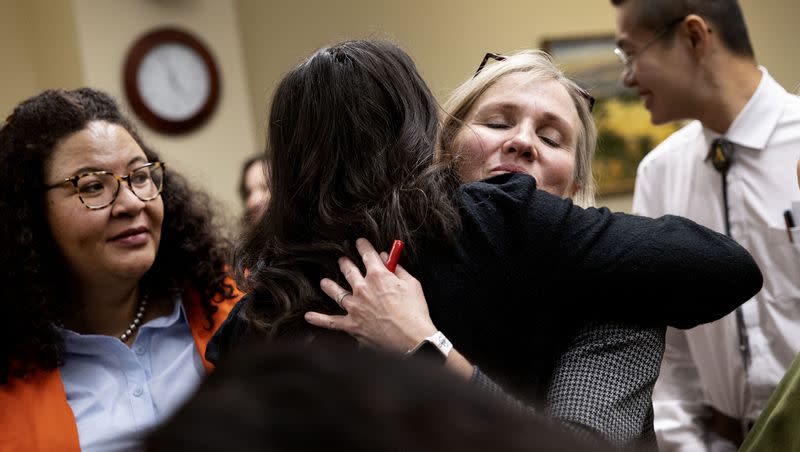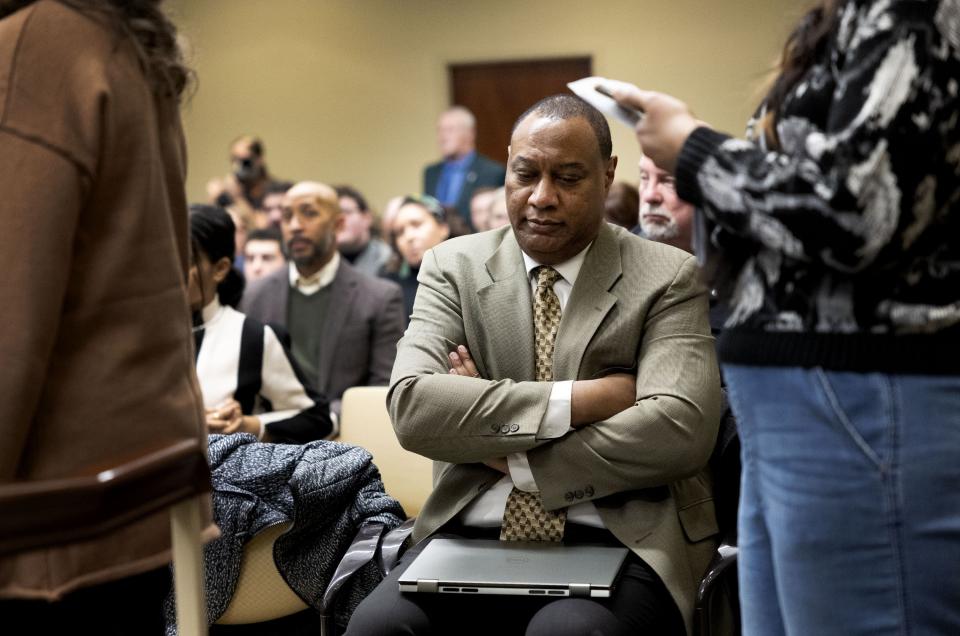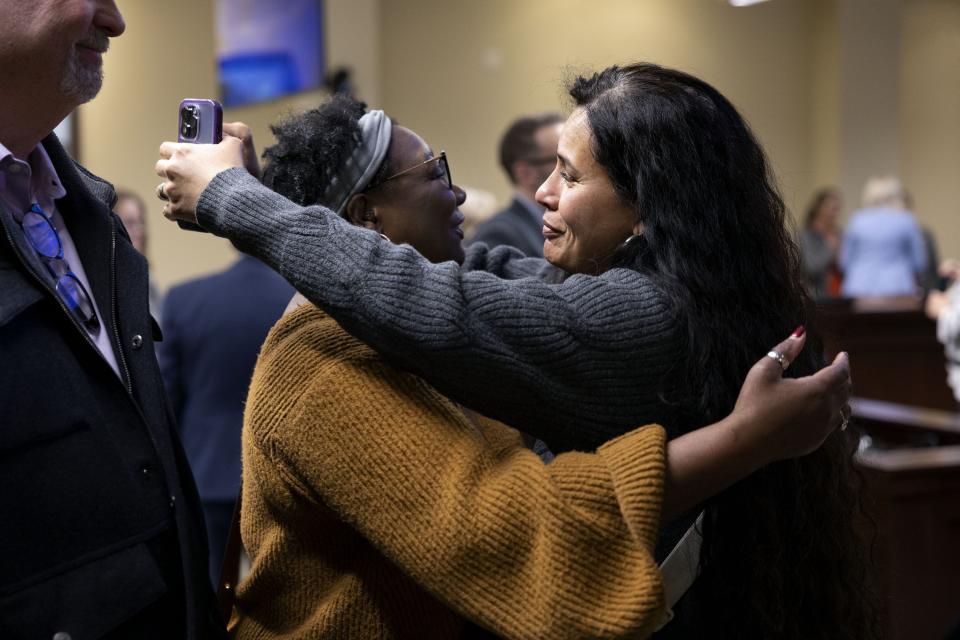A Utah bill that restricts DEI advances after emotional hearing

- Oops!Something went wrong.Please try again later.
A bill that would ban some diversity, equity and inclusion practices in Utah public institutions received a state House committee recommendation Wednesday after an extended hearing that included hours of emotional debate.
The bill, HB261, titled “Equal Opportunity Initiatives,” aims to outlaw DEI trainings, requirements, programs and offices at public universities, schools “or any other institution of the state” that engages in what the legislation calls “prohibited discriminatory practices.”
The bill also requires public institutions to maintain neutrality on political topics, conduct trainings and surveys focused on free speech, and ensure all students are able to access programs that provide student success resources.
State funding can be withheld if institutions fail to address violations of these requirements, the bill says.
After receiving a 12-2 favorable recommendation along party lines from the House Education Standing Committee, the bill will now be voted on in the House. The bill is expected to pass the House as soon as this week, with a Senate hearing coming early next week.
Despite unanimous support among Republican committee members, the three-hour-long meeting was characterized by vigorous disagreement between lawmakers and concerned citizens about the merits of DEI and the potential implications of the bill.
Why are Utah lawmakers looking to ban DEI?
Freshman Rep. Katy Hall, R-South Ogden, the bill’s sponsor, presented the bill to the committee before facing clarifying questions from her Capitol colleagues.
Hall, who failed to pass a bill banning diversity statements in hiring last year, said the genesis of HB261 was university professors, most of them self-described liberals, reaching out to her during the interim period about the need to curb DEI practices.
According to Hall, these professors said they had noticed a trend of students and faculty avoiding open discussion in fear of crossing an orthodoxy of “diversity activism.” Through collaboration with university authorities, and other stakeholders, Hall said she developed what she considers a new approach to reestablish academic viewpoint diversity while keeping resources in place to help a diverse student body succeed.
“Our colleges and universities must focus on their core missions of embracing academic excellence, fostering innovation and cultivating a free marketplace of ideas,” Hall said. “This bill is focused on removing barriers for all students who overcome adversity through hard work, initiative and talent.”
Related
The need for diversity and inclusion in academia and the workplace is not controversial, she said, but such goals are missed when they are pursued through differential treatment based on immutable characteristics. The bill would not close cultural centers, defund scholarships or exclude students who are already receiving special campus resources, Hall explained. But it would make such help available to everyone based on individual needs.
“A narrow focus on diversity metrics unavoidably forces leaders to come up with arbitrary targets that are hard to justify,” Hall said. “We must get back to the principles that foster viewpoint diversity, academic freedom, freedom of expression and political neutrality. That’s what 261 does.”
Will Utah’s anti-DEI bill affect trainings, grants or special ed programs?
Hall was questioned about the practical impact of HB261 on minority communities by the committee’s Democratic representatives, including House Minority Leader Angela Romero, D-Salt Lake City.
Romero, and Rep. Carol Spackman Moss, D-Holladay, pressed Hall on whether her bill would force school teachers to abandon training to help them serve students who speak English as a second language. The lawmakers also brought forward constituent concerns about the bill’s impact on city and county offices and federal grants.
The bill contains carve outs for federal laws and grants, Hall said, and no training or office will be affected by HB261 unless they violate the bill’s “prohibited discriminatory practices.” The same goes for special ed programs, student groups and course content, Hall continued.
According to the legislative text, banned DEI practices would include maintaining any policy or office that:
Promotes differential treatment in hiring, admissions, promotions and program participation based on “personal identity characteristics.”
Asserts in trainings, initiatives or procedures, “directly or indirectly,” that individuals with one personal identity characteristic are inherently superior, privileged, oppressed or culpable for past actions, because of their personal identity characteristics.
Requires statements of an individual’s position on DEI initiatives, or topics like anti-racism, critical race theory or racial privilege, before taking action in regards to employment, termination, seniority status or state financial aid, among other things.
Carries the title “diversity, equity, and inclusion.”
The bill does not prohibit policies required under state or federal law related to discrimination or harassment, including Title VII and Title IX provisions.
Hall was joined by former state GOP chair James Evans, who served as Utah’s first African-American state senator from 2002 to 2004. Evans said, with a few “procedural fairness” modifications “the mission of DEI can continue under this bill.”

“Finally, conservatives are stepping to the table and putting our solutions on the table and how we can ensure equality of opportunity for all without imposing discrimination on anyone,” Evans said.
Do Utahns support DEI programs?
Wednesday’s hearing was attended by over 150 Utahns, ranging from concerned citizens to college administrators, lobbyists and advocacy groups. Over the course of 90 minutes, over 45 constituents spoke about whether DEI programs are necessary to redress past disparities and help minority students feel safe on campus, or whether they provide unequal assistance and actually stoke racial divisions.
One speaker, currently a student at Brigham Young University, who said he was a “defector from communist China,” and a young woman who said she was raised under communist rule in Cuba, claimed DEI programs had a “dangerous” effect on free speech and were in opposition to the equal rights that already exist in America.
But others, including business owners and college students, shared how they believe DEI is essential to protect minority youth and create a level playing field for academic success.
Related
Dr. Sean Crossland, an assistant professor of higher education leadership at Utah Valley University, echoed a complaint shared by several others that Hall had failed to provide evidence that DEI programs were producing negative outcomes for Utah students and encouraged lawmakers to speak with students who have benefited from DEI offices.

Romero, the state House’s top Democrat, agreed that this was the missing element in Hall’s bill.
“I am a product of diversity, equity and inclusion,” she said. “Many of you, I know with your hearts, feel like this going to bring a level playing ground. But I can tell you, in many of our communities, people feel like they’re being erased.”
Just prior to the committee’s vote on the bill, Hall said she hoped her bill would communicate just the opposite.
“I hope that this sends a strong message that we care about equality of opportunity for all students, that we want to see every student as an individual,” Hall said.

